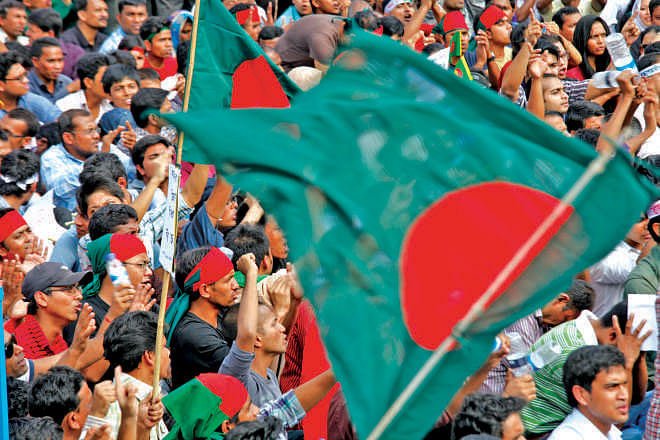The 'Citizen' Who Never Was
The 'Citizen' Who Never Was

It is not often that a people, even if it be its representation, lament the natural death of a 91-year old. The reason is not far too seek. Only about 43 years ago in 1971, so heinous and wholesale was his crime against humanity that even the youth of today (who were not even born then) have prayed for his capital punishment. The children have heard from their parents, grandparents and the elders the gruesome tales of the one of the foremost advocates of the doctrines of Maudud; not the clown who cannot decide about his loyalty to BNP, or for that matter any other party or ideology.
Among others, Ferdousi Priyabhashini, artist, pro-war crimes trial activist and a victim of crimes against humanity, said Ghulam Azam was a 'lucky man' because he escaped execution. 'It's beyond imagination,' she said. 'Though he had to face trial after 40 years of committing crimes, the verdict could not be effective, as he had been in jail indeed for a short period of time. Instead, he was in hospital where he got services at tax payers' expense.'
Late Ghulam Azam had pinned his entire life on to the ideologies of Islamist thinker in India, and later Pakistan, Sayyid Abul Ala Maududi, who founded Jamaat-e-Islami nearly seventy years ago. They resisted the creation of Pakistan (albeit only politically) as opposed to trying to obliterate Bangladesh militarily by abetting with the then Pakistani forces, the most brutal armed anti-civilian state machinery in modern times, in perpetuating a genocide of the Bangalee people.
“After years of sabotaging the creation of Pakistan, denouncing Ali Jinnah as a religious lightweight and decrying democracy as satan's handiwork, (Indian-born) Maududi made an astonishing 180 degree flip and embraced Pakistan, Jinnah and democracy.” (Faisal, Al Spittoon, 28-06-2010) Some suspect that this was Maududi's ploy, strategy if you will, to “further the aims of Jamaat-e-Islam and turn Pakistan into an Islamic state?”In fact, Maududi left his ancestral home in Aurangabad, India in 1947 and migrated to Lahore, Pakistan to set up home.
Ghulam Azam's stark difference with his 'guru' was that he never accepted Bangladesh, perhaps seeing how Maududi's turnaround Pakistan plan had failed, but more so because he had a Bangladeshi political fan base, self-seeking though they were, to cheer him on. And yet he breathed the air of independent Bangladesh, did active politics, was attended by Bangladeshi doctors, was defended by Bangladeshi lawyers, and his party members flew the Bangladeshi flag on their ministerial car when a few of them were sworn into two Khaleda Zia-led cabinets. Shame on us, perhaps said he.
Having fled from Bangladesh in December 1971, he returned to Bangladesh 1978 with a Pakistani passport and a Bangladeshi visa. He lived in Bangladesh illegally without any authorised Bangladeshi visa from 1978 to 1994, when the Bangladesh Supreme Court reinstated his citizenship.
In Shadhin Bangla, Ghulam Azam, after being protected by 'law' and humoured by successive governments, was finally arrested in January 2012 on charges of committing crimes against humanity and peace, genocide and war crimes in 1971.
A convicted war criminal, Ghulam Azam, as the elected General Secretary of DUCSU, during Pak Prime Minister Liaquat Ali Khan's East Pakistan tour November 1948 had read out the welcome address and presented on behalf of the Rashtrabhasha Sangram Parishad a memorandum demanding provincial autonomy and Bangla as a state language, which his Jamaat-e-Islami party tries to publicise as his positive 'role in the Language Movement' although Ghulam Azam later said 'that was a mistake'. (bdnews24.com/2014-10-25)
What did Ghulam Azam actually do in 1971 to earn the wrath of the people of Bangladesh?
Historian Muntassir Mamoon, the first prosecution witness in the war crimes case against the former Jamaat Ameer said, “Azam was the symbol of evil forces that committed genocide and crimes against humanity. He never repented for his role during the Liberation War in 1971”.
'Despite being accorded the protection of Bangladeshi law and due process, in contrast to the summary executions that he and his Pakistani allies presided over, he never recanted his statements against the state. Ghulam's Jamaat-e-Islami, its student wing Islami Chhatra Sangha (now Islami Chhatra Shibir) and their allies not only opposed the birth of Bangladesh by collaborating with the Pakistani occupation force, but also committed heinous premeditated crimes on a horrific scale during the nine-month War of Independence.' (Julfikar Ali Manik, Ghulam's Jamaat: Genesis of genocide, Dhaka Tribune, 25 October 2014)
At the International Crimes Tribunal, “the charges against Azam were conspiring, planning, incitement to and complicity in committing genocide, crimes against humanity, and other war crimes and torture and killing of a police officer Shiru Mia and three other civilians. He was found guilty on all five charges and sentenced to 90 years in prison. The judges unanimously agreed that Azam deserved capital punishment but was given a lenient punishment because of his age and health condition.”Ghulam Azam died of a stroke on 23 October 2014.
Why then the huge crowd at his funeral at Baitul Mukarram two days after his death? Simple. The peaceful political situation existed to allow the final prayers of a soul departed. Those who wanted to pay him respects could come unhindered to the national masjid. His party has a large dedicated following, not a 'huge' vote bank as some prejudiced talkers expound at late night pastimes on our national TV channels, and if many of them and their F&F did come to his Janaza prayers, the crowd would be huge. We have a very large population, remember?
The crowd was so because he was also granted his wish to be buried beside his father at Maghbazaar, Dhaka. “Ghulam Azam has at last got his last resting place in Bangladesh, the country he did not want believe in his lifetime.” (bdnews24.com)